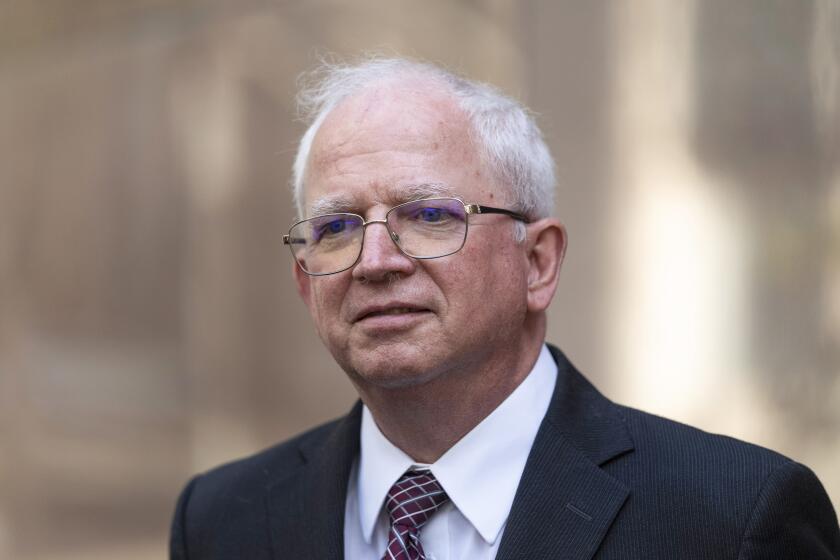New Generation Includes Women, Ethnics : Evangelicals Searching for Young Stars to Replace Aging Leadership
Evangelist Billy Graham turned 68 last month. Campus Crusade founder-president Bill Bright is 65. Some other U.S. figures influential in world evangelization are even older.
Neither Graham nor Bright are talking about retirement yet, but key evangelicals are taking steps to identify and equip a younger generation for leadership in the closing years of the 20th Century.
Conferences bringing together young Christian achievers with a missionizing bent--especially those under 40--are planned for Singapore next year and for Washington in 1988.
Preludes to Meeting
Those meetings are intended as preludes to a second world evangelization conference at Lausanne, Switzerland, in 1989. The first such conference in that city in 1974 launched unprecedented coordination on evangelizing strategy and philosophy by many conservative Protestant church leaders and officials from organizations such as Campus Crusade.
American officials of the so-called Lausanne movement, who met last week at Indian Wells near Palm Desert, Calif., and this week at Arrowhead Springs in the San Bernardino Mountains, have spearheaded the decisions to motivate younger leaders.
Their overall religious goals remain the same--spreading the Gospel and fulfilling the New Testament “great commission” to make disciples in all nations. But it was clear that generational differences in both style and substance will surface if emerging young evangelicals are handed the reins, organizers said.
Unlike the present leadership made up predominantly of white American males, the new generation of evangelization strategists will include many women, non-Caucasians and people in Third World countries.
Assembly Planned
Glandion Carney, 37, a black Christian who works for World Vision, based in Monrovia, is chairman of Leadership ‘88, the planned assembly of 2,200 young evangelicals in Washington June 27-July 1, 1988.
“Minority groups have been neglected in the past” for leadership positions, Carney said at a news conference in Indian Wells. “And we have a strong commitment to give women a platform.”
Evangelical author-lecturer Rebecca Manley Pippert, 38, of Boston, whose book, “Out of the Salt Shaker,” has sold 400,000 copies, is Leadership ’88 vice chairwoman--not vice chairman, as the title would read in many evangelical groups.
An older view that women have limited capabilities was reflected in a joke told by a Lausanne movement official at one table during lunch at Indian Wells’ Erawan Garden Hotel. The official, commenting on the remark by one man that his wife wanted to take him shopping, said, “You know, that’s the difference between men and women. Men want to know what the future holds in store. Women want to know what the store will hold in the future.”
Not Funny to All
Roberta Hestenes, 47, a Fuller Theological Seminary faculty member who chairs the international work of World Vision, said that would not be a funny joke even to some older evangelicals represented at the Leadership ’88 senior advisory committee meeting.
“There is a transition,” said Hestenes, who is on the committee. “Some of the older persons are struggling with language. Many others have crossed over and now use inclusive language,” she said, indicating that people who avoid using “men” and “brothers” to stand for both sexes are usually also sensitive about avoiding stereotypical images of women.
Another sensitive subject--ecumenical cooperation with Roman Catholics in certain ministries--was broached by the 75-member committee at Indian Wells. Among a dozen “challenges and opportunities” for Leadership ’88 identified by a draft statement was the opportunity for “new ecumenical cooperation among those who lift up and emulate Jesus Christ, including those within the Catholic community.”
Some especially conservative Protestant churches believe that nominal Roman Catholics are legitimate targets for conversion. For their part, Catholic bishops have been upset over proselytizing activity by evangelical churches among Latinos in this country and overseas.
Evangelistic Fervor
However, officials noted that the Lausanne movement, which embraces the charismatic-Pentecostal churches along with traditional evangelical churches, has people who have been impressed with the evangelistic fervor of the charismatic renewal movement in the Catholic Church.
The search for younger evangelical leaders was launched by evangelist Leighton Ford of Charlotte, N.C., world chairman of the Lausanne Committee. Ford, 55, worked for many years on the evangelistic staff of his brother-in-law, Billy Graham, but he left in 1985 and formed his own organization last year.
About 10 to 15 years ago, it was speculated that Ford was Graham’s heir-apparent, but a healthy and active Graham continues to schedule both U.S. and foreign crusades with no indication of a retirement date. When asked about his successor, Graham has diplomatically pointed to the thousands who attended his European conferences for itinerant evangelists in 1983 and this year as his “heirs.”
Ford said it was the 1981 death during heart surgery of his son Sandy, 21, that prompted him to launch his own project of finding and encouraging young Christian leaders. His son had been a leader in Christian activities on the University of North Carolina campus, Ford said.
Singapore Conference
Enlisting the aid of Brian Stiller, the 44-year-old president of the Evangelical Fellowship of Canada, Ford has organized a conference in Singapore for 350 young leaders outside the United States. Later, plans developed for an equivalent U.S. conference in Washington.
“I believe a new generation of creative leadership under 40 is emerging,” Ford said at the news conference with Carney, the Leadership ’88 chairman.
Ford noted that the old guard associated with the Lausanne movement and the evangelical movement in general includes, besides Graham and Bright, recently retired Assemblies of God executive Tom Zimmerman, 74; theologian Carl Henry, 73; world missions authority Donald McGavran, 89, and Ted Engstrom, 70, whose successor as World Vision’s U.S. president was named this week.
(Bright, interviewed this week, said he has tried to grow with his 35-year-old organization, which has 16,000 staff members in 160 countries. “I don’t ever expect to retire until the Lord tells me to,” he said. “We’ve been a team ministry from the very beginning. If anything happened to me, the movement would not be hindered. If anything, it would accelerate.”)
Promising Newcomers
Asked about promising newcomers, Ford named Leadership ’88 officials Carney and Pippert; Ron Jensen with Campus Crusade’s School of Theology; Susan Perlman with Jews for Jesus’ San Francisco headquarters; Fernando Ajith of Sri Lanka, and Romez Atallah of India. Most of them are in their late 30s.
“There seems to be relatively few potential leaders between the ages of 40 and 55,” Ford said.
Hestenes, in a separate interview, said that of women she expects to be in the forefront she includes Sue Baldauf of Evangelicals for Social Action in Washington, systematic theologian Eloise Fraser of Eastern Baptist Theological Seminary near Philadelphia, and New Testament scholar Mary Ann Meye of Pasadena’s Fuller Seminary--all women in their 30s.
The new leadership will not necessarily include the evangelical “superstars,” Ford and Carney said.
“We have a lot of empire builders interested in their careers and reputations, but we need Kingdom builders,” said Ford, alluding to the Christian expression “Kingdom of God.”
Emphasis on Teamwork
“We see ourselves as servants,” Carney added. He said there would be more teamwork and less reputation-building.
Pippert, interviewed from her Boston home by telephone, said that she hopes that the future evangelical leadership will include many Christians who are working professionals in secular fields.
“Christians who have been in full-time Christian work all their lives sometimes offer models for witnessing to their faith that are unrealistic,” Pippert said.
She said she objects to the idea that the most effective evangelizing involves persistent conversations in the workplace, even if friendly, about Jesus and salvation. More effective, Pippert said, are Christians who do excellent work with a sense of ethics and sensitivity toward others.
More to Read
Start your day right
Sign up for Essential California for news, features and recommendations from the L.A. Times and beyond in your inbox six days a week.
You may occasionally receive promotional content from the Los Angeles Times.






